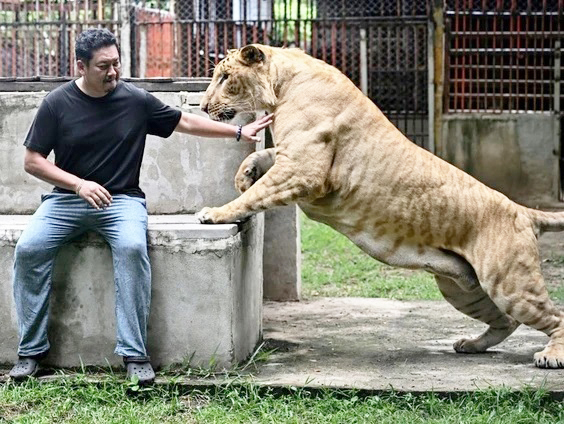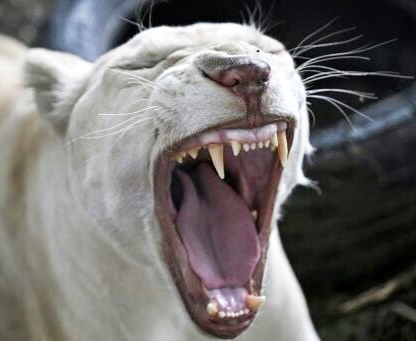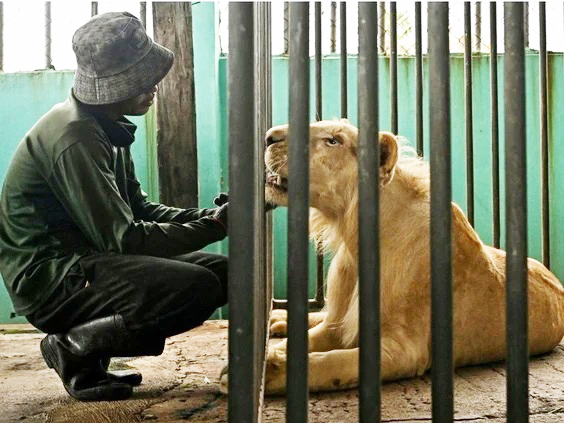The lion business is busy
Behind a car repair business on a nondescript Thai street are the cherished pets of a rising TikTok animal influencer: two lions and a 460 pound lion-tiger hybrid called “Big George.” Lion ownership is legal in Thailand, and Tharnuwarht Plengkemratch is an enthusiastic advocate, posting updates on his feline companions to nearly three million followers. “They’re playful and affectionate, just like dogs or cats,” he told AFP from inside their cage complex at his home in the northern city of Chiang Mai. Thailand’s captive lion population has exploded in recent years, with nearly 500 registered in zoos, breeding farms, petting cafes and homes.
Experts warn the trend endangers animals and humans, stretches authorities and likely fuels illicit trade domestically and abroad. “It’s absolute madness,” said Tom Taylor, chief operating officer of conservation group Wildlife Friends Foundation Thailand. “It’s terrifying to imagine, if the laws aren’t changed, what will the situation is going to be in 10 years.” The boom is fueled by social media, where owners like Tharnuwarht post light-hearted content and glamour shots with lions. “I wanted to show people… that lions can actually bond well with humans,” he said, insisting he plays regularly with his pets. He entered Big George’s enclosure tentatively though, spending just a few minutes being batted by the tawny striped liger’s hefty paws before retreating behind a fence. Since 2022, Thai law has required owners to register and microchip lions, and inform authorities before moving them. But there are no breeding caps, few enclosure or welfare requirements, and no controls on liger or tigon hybrids.
Thai trader Pathamawadee Janpithak started in the crocodile business, but pivoted to lions as prices for the reptiles declined. “It gradually became a full-fledged business that I couldn’t step away from,” the gregarious 32-year-old told AFP in front of a row of caged cubs. She sells one-month-olds for around $15,500, down from a peak as breeding operations like hers increase supply. Already stretched authorities face difficult choices on enforcing regulations, as confiscated animals become their responsibility, said Penthai Siriwat, illegal wildlife trade specialist at WWF Thailand. “There is a great deal of deliberation before intervening… considering the substantial costs,” she told AFP. Owners like Tharnuwarht often evoke conservation to justify their pets, but Thailand’s captive lions will never live in the wild. Two-year-olds Khanom and Khanun live in a DNP sanctuary after being confiscated from a cafe and private owner over improper paperwork. They could survive another decade or more, and require specialized keepers, food and care. Sanctuary chief vet Natanon Panpeth treads carefully while discussing the lion trade, warning only that the “well-being of the animals should always come first.” Sadudee is hopeful some provisions may be tightened, though a ban is unlikely for now. He has his own advice for would-be owners: “Wild animals belong in the wild. There are plenty of other animals we can keep as pets.”
Waiting on the lion
What happened to the overconfident lion-keeper?
He was consumed by his own pride.
How do Lions, Tigers and Elephants fly?
On the African plain.
Did you hear about the guy who changed his name after surviving being attacked by a lion?
He’s now called Claud.
A man enters zoo enclosure to feed the lions…
Succeeds.
August 7th Birthdays
1962 – Maggie Wheeler, 1975 – Charlize Theron, 1983 – Abbie Cornish, 1993 – Francesca Eastwood
1992 – Mike Trout, 1997 – Brett Gray, 1960 – David Duchovny, 1967 – David Mann





